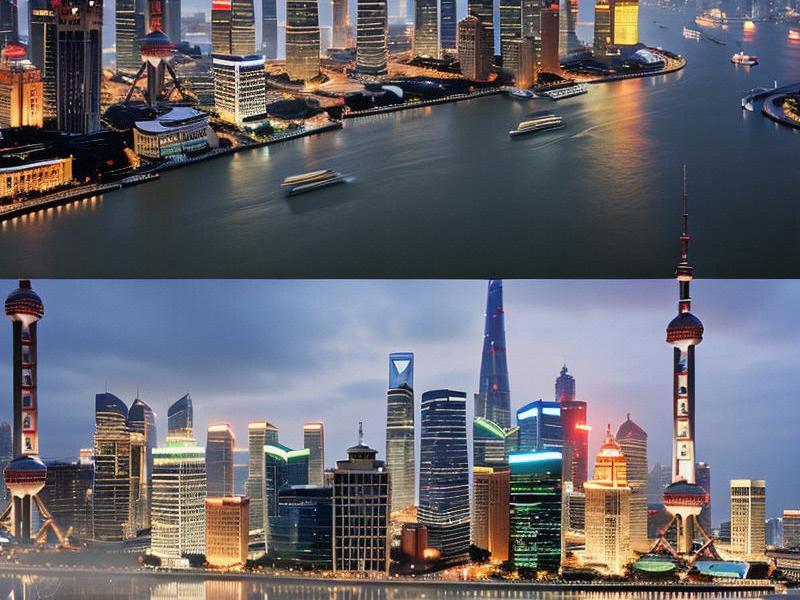
Shanghai, often referred to as the "Pearl of the Orient," stands as a testament to China's rapid urbanization and economic growth. Once a modest fishing village along the banks of the Huangpu River, Shanghai has evolved into one of the world's most dynamic and influential cities. Its strategic location at the mouth of the Yangtze River has made it a crucial hub for trade and commerce, connecting China to the rest of the world.
The economic transformation of Shanghai is nothing short of remarkable. In the late 19th century, the city became a treaty port following the First Opium War, opening its doors to foreign trade and investment. This marked the beginning of Shanghai's rise as a global financial center. Today, it is home to the world's busiest container port, handling millions of tons of cargo annually. The city's skyline is dominated by iconic skyscrapers such as the Shanghai Tower, which stands as the tallest building in China and the second-tallest in the world.
Shanghai's economy is characterized by its diverse sectors, including finance, manufacturing, technology, and retail. The city is a major financial hub, with the Shanghai Stock Exchange being one of the largest in Asia. It attracts global investors and multinational corporations, making it a key player in the international business arena. The rapid development of the Pudong area, a former swampy marshland, into a modern business district exemplifies Shanghai's ability to adapt and innovate.
Beyond its economic achievements, Shanghai is a city of cultural fusion. It is a melting pot of Chinese and Western influences, reflecting its history as a meeting point of different civilizations. The Bund, a historic waterfront promenade, showcases a blend of colonial architecture and modern skyscrapers, symbolizing the city's historical and cultural significance. The French Concession, with its charming cobblestone streets and tree-lined boulevards, offers a glimpse into the city's colonial past.
新上海龙凤419会所 Shanghai's cultural scene is vibrant and diverse. It is home to numerous museums, art galleries, theaters, and music venues. The Shanghai Museum, renowned for its extensive collection of Chinese art, attracts millions of visitors each year. The city also hosts major cultural events such as the Shanghai International Film Festival and the Shanghai Fashion Week, which draw international attention and contribute to its global reputation.
The urban development of Shanghai is a marvel of modern engineering and planning. The city has invested heavily in infrastructure, transportation, and public services to accommodate its growing population and economic activities. The Shanghai Metro, one of the busiest and most efficient subway systems in the world, provides convenient and affordable transportation for millions of residents and tourists.
The city's commitment to sustainability and green development is evident in its efforts to reduce pollution and promote environmental conservation. Initiatives such as the construction of green spaces, the promotion of electric vehicles, and the implementation of energy-efficient building standards demonstrate Shanghai's dedication to creating a livable and sustainable urban environment.
Shanghai's education system is another area of excellence. The city is home to prestigious universities and research institutions, attracting students and scholars from around the world. Fudan University and Tongji University are among the top institutions in China, offering a wide range of academic programs and fostering innovation and research.
上海喝茶群vx The city's healthcare system is also highly developed, providing quality medical services to its residents. Shanghai has established itself as a global center for medical research and treatment, with state-of-the-art hospitals and specialized clinics.
Shanghai's role in global affairs is increasingly significant. It is a member of the World Trade Organization and a founding member of the Asian Infrastructure Investment Bank. The city actively participates in international dialogues and cooperation, contributing to global economic stability and development.
The future of Shanghai looks promising, with ongoing plans for further urban development and innovation. The construction of the Hongqiao Comprehensive Transportation Hub, which integrates air, rail, metro, and bus services, will enhance the city's connectivity and efficiency. The development of the Shanghai Free-Trade Zone aims to promote trade liberalization and economic reform, positioning Shanghai as a leader in global trade.
爱上海 Shanghai's success story is not without challenges. The rapid urbanization has brought about issues such as housing shortages, traffic congestion, and environmental concerns. However, the city government has implemented various measures to address these challenges, including the promotion of affordable housing, the expansion of public transportation, and the enforcement of environmental regulations.
The people of Shanghai are known for their resilience, adaptability, and entrepreneurial spirit. They have played a crucial role in the city's transformation, contributing to its economic prosperity and cultural vibrancy. The city's diverse population, with a mix of native Shanghainese and migrants from other parts of China and abroad, reflects its cosmopolitan character.
Shanghai's cuisine is another aspect that adds to its charm. The city is renowned for its vibrant food scene, offering a wide variety of dishes that blend traditional Chinese flavors with international influences. From the famous xiaolongbao (soup dumplings) to the trendy rooftop bars and Michelin-starred restaurants, Shanghai's culinary offerings cater to all tastes and preferences.
In conclusion, Shanghai stands as a symbol of China's modernization and global integration. Its economic achievements, cultural diversity, urban development, and commitment to sustainability make it a model city for the 21st century. As Shanghai continues to evolve and innovate, it remains a beacon of progress and a source of inspiration for cities around the world.
